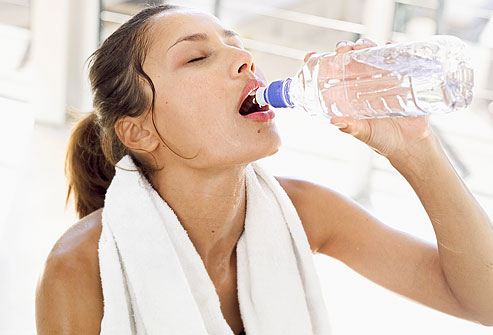No ordinary man can survive more than one day without water, and especially for athletes, hydration is essential.
Are 8 glasses a day enough?
Now that we understand how important water is to the proper functioning of the body, it automatically raises the question "How much water should I drink?” The standard answer is: 8 glasses per day. However, it does not seem normal for a girl who weighs 99 pounds and is 5.2 ft. to drink as much water as a professional athlete of 6ft and 220 pounds? Indeed, it does not seem to be a realistic calculation. People have different shapes, different weights and diets and therefore it is different for each and every one of us.
How much water do I need?
Trainers say you should talk to a nutritionist to calculate your water needs depending on the characteristics of your body. In principle, it seems that if you sleep 8 hours a night – so you spend 16 hours awake – it would be ideal to drink a glass of water every hour. The simplest method would be to keep a flask of 1 gallon of water which you drink, and you write down to the end of the day how much water you need. You need to drum mark. Then, if you manage to drink all the water that means you’ve satisfied your "hydration needs" for that day.

Avoid dehydration the best you can!
You should know that when you feel the sensation of thirst it is likely you already are dehydrated. This is how your body tells you to consume more water. Fitness coaches say that when you set your daily water needs, you should not forget that it is only about water. So the equivalent of sodas or coffee does not have the same effect. Of course, soft drinks contain water – but they also have chemicals and you can do more harm than good.
Distilled water, mineral water, plain water – what to drink?
In general, distilled water does not contain some minerals that are found in ordinary water. Therefore, dehydration or fatigue can occur – in the case of athletes, who need as many minerals as they can, for they remove most of them during training. Mineral water is good in moderation – minerals in excess, when not required, may have unpleasant effects. Filtered water seems to be the most balanced choice – you still have to talk to a nutritionist doctor, because water is not as harmless as it looks and it is good to know what is good for you.
Active people need more water
Those who exercise in an intensive way need more water than people with ordinary daily activities. Why? Simply because the muscles are composed mainly of … you know it – water! Generally, the more active you are, the more you strain you muscles. Consequently, you need to drink more water – as you need fuel for the muscles, to keep them hydrated. In terms of water quantity to be drunk, experts recommend the following: with 20 to 30 minutes before training, 9 to 10 ounces of water, every 10 to 15 minutes, 3 to 3.5 ounces of water, then, about 30 minutes after the training session, again from 9 to 10 ounces of water. Remember that these quantities are still measured by body weight and muscle mass.
How do I know if I drink enough water?
The simplest test in this respect is easily achievable at home. Urine color is a good indicator. If generally it is transparent and clear the hydration is optimal. If it is yellow or loses its clarity, you need to drink more fluids.
Watch out for … water poisoning!
Over-hydration is as dangerous as the opposite. Research has shown that, too much water can cause imbalances in the body. In the case of athletes, there were situations when they literally collapsed during the competition – due to water intoxication (hyponatremia) or when it is not properly disposed of. This intoxication stresses the body, causing changes in the brain, but also lung congestion and muscle weakening. So the recommendations for drinking water are to keep it at a balanced level as it is removed!
February 15, 2010
Exercise & Fitness, Weight Loss Tips